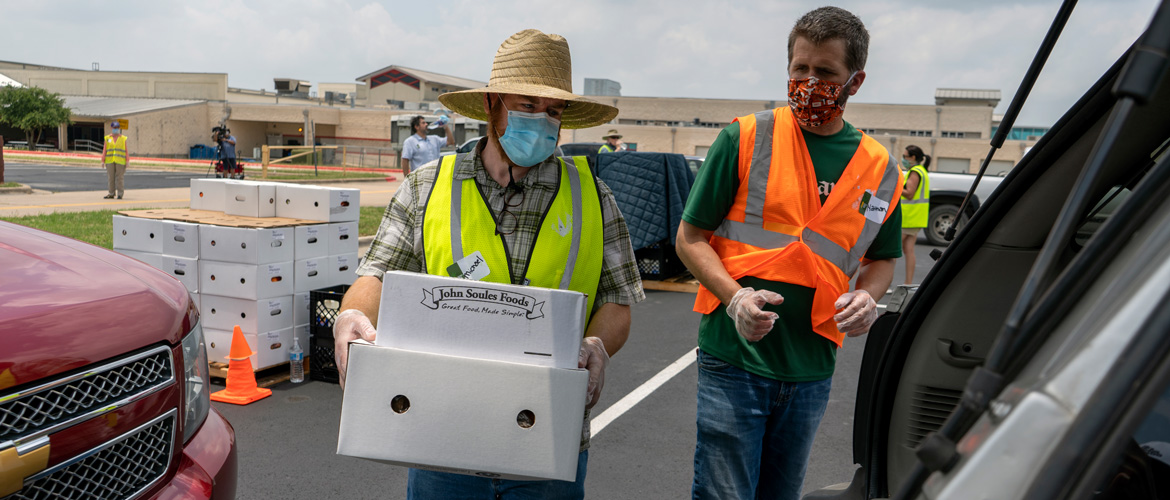Services and resources helping people meet needs like home repair, transportation and healthy food often play a major role in medical outcomes.
In Texas, life expectancy can vary as much as 30 years, depending on ZIP code, according to research at the University of Texas Southwestern Medical Center in Dallas. Those in ZIP codes with more than 20% poverty lived an average of 76.4 years — six years less than people living in ZIP codes with just 5% poverty.
Even in the area surrounding the state capital Austin, one of Texas’ most affluent cities, life expectancy may differ more than 10 years based on where someone lives.
“Austin is a tale of two cities,” says Paul Gaither, marketing and communications director of the Austin-based Central Texas Food Bank. On one side, it’s becoming a fast-growing technology and innovation hub that’s attracting people from across the country searching for a city with a low cost of living. On the other is Austin’s low-income workers, priced out of the city’s center and into underserved areas where they struggle to support their families. More than 13% of the city’s population lives in poverty.
"People are living on the edge financially,” Gaither says, adding pandemic-related job losses and layoffs exacerbated problems, with nearly half a million people in Central Texas facing hunger. Central Texas Food Bank is one of several statewide that is supported by Blue Cross and Blue Shield of Texas (BCBSTX).
“Our members are in need of the basics — food and shelter — which is affecting their health and health outcomes."
The company is working with several community organizations and agencies to offer help to thousands of Austin-area Medicaid members. BCBSTX coordinators refer and connect members to Central Texas nonprofit groups and public entities providing healthy food, housing and utility assistance and health care.
“There are a lot of places for families who need assistance,” says Zenaida Martinez Nava, a BCBSTX Medicaid senior community outreach supervisor. Organizations offering food and utility assistance are most requested, she says.
Insurers, health care providers and policymakers understand how factors such as housing, healthy food and income influence health, especially for people with Medicaid coverage. These social determinants of health and health-related behaviors may account for as much as 80% to 90% of a person’s health outcomes.
BCBSTX helps bridge these gaps with grants to nonprofit organizations that help underserved communities and connect BCBSTX members and their neighbors to services Medicaid doesn’t cover.
“Our members are in need of the basics — food and shelter — which is affecting their health and health outcomes,” Martinez Nava says. “It’s very important to have these resources to offer our members who don’t know how their rent is going to get paid as they put food on the table.”
BCBSTX is a division of a mutual legal reserve company operating Medicaid managed care plans in three states. The company has worked with other Medicaid managed care organizations and AHIP, a national industry group representing health insurers, to pursue policy changes to provide more support for meeting people’s medically related socioeconomic and health needs.
Helping members access a broader range of maternal and social services and meet basic needs would improve health equity and lower health care costs, says Gloria Eldridge, the company’s Medicaid policy divisional vice president. For example, paying for internet services to facilitate telehealth visits or doulas (nonmedical birthing professionals) to improve members’ maternal outcomes could help reduce health disparities, she says.
“It would impact millions of people for the better in Texas and nationally,” Eldridge says.
Although Medicaid pays for half of all births in Texas, that coverage doesn’t guarantee low-income women in Austin prenatal or postpartum care and services, says Morgan Miles.
“Austin has a wealth of resources for those who can afford them,” says Miles, executive director of Giving Austin Labor Support, or GALS, a nonprofit organization supporting maternal needs of underserved mothers. “For women with Medicaid, it can be really challenging to find providers. The care they receive looks a lot different.”
With the help of a BCBSTX grant, GALS is expanding prenatal and postpartum services to 40 families to improve maternal health outcomes for Black, Native American and other women of color. Its workers provide prenatal education, support groups, healthy food, birthing support, car seats and postpartum meals and check-ins. Since 2009, the organization has served more than 600 Central Texas families.
“We want Austin to become a place where disparities don’t exist,” Miles says.

